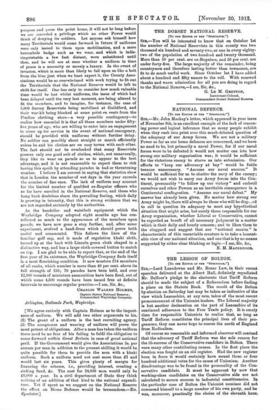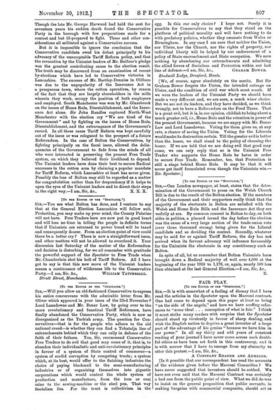THE LESSON OF BOLTON.
[To rlin EDITOR OF THE "SPECTATOR:]
SIR,—Lord Lansdowne and Mr. Bonar Law, in their recent speeches delivered at the Albert Hall, definitely repudiated Mr. Balfour's pledge to the electorate that Tariff Reform should be made the subject of a Referendum before finding a place on the Statute Book. The result of the Bolton by-election on Saturday last may be taken as indicative of the view which Lancashire, at any rate, takes of the most recent pronouncement of the Unionist leaders. The Liberal majority is but another declaration on the part of Lancashire of its continued adherence to the Free Trade policy. It is surely time for responsible Unionists to realize that, so long as Tariff Reform constitutes the principal item of their pro- gramme, they can never hope to rescue the north of England from Radicalism.
Of course no reasonable and informed observer will contend that the advocacy of Tariff Reform was the sole reason for the ill-success of the Conservative candidate in Bolton. There were many other contributing causes. In the first place the election was fought on an old register. Had the new register been in force it would certainly have meant three or four hundred additional votes for the cause of Unionism. Another disadvantage was to be found in the personality of the Con- servative candidate. It most be apparent by now that working-class candidates on the Conservative side are not calculated to secure success in industrial constituencies. In the particular case of Bolton the Unionist nominee did not commend himself to a large number of his own party, and he was, moreover, practically the choice of the eleventh hour.
Though the late Mr. George Harwood had held the seat for seventeen years his sudden death found the Conservative Party in the borough with few preparations made for a contest and but ill-prepared to fight. These and other con- siderations all militated against a Conservative success.
But it is impossible to ignore the conclusion that the Conservative candidate owed his defeat principally to his advocacy of the unacceptable Tariff Reform policy, and that the revocation by the Unionist leaders of Mr. Balfour's pledge was the greatest contributing cause to the election result. The truth may be discovered from an examination of recent by-elections which have led to Conservative victories in Lancashire. The success of Mr. Bartley-Denniss in Oldham VMS due to the unpopularity of the Insurance Act in a prosperous town, where the cotton operatives, by reason of the fact that they are largely shareholders in the mills wherein they work, occupy the position of both employers and employed. South Manchester was won by Mr. Glazebrook on the issues of Home Rule, Disestablishment, and the Insur- ance Act alone. Sir John Randles captured North-West Manchester with the election cry "We are tired of the Government" and by fighting on the issues of Home Rule, Disestablishment, and the extravagance of the Government's record. In all these cases Tariff Reform was kept carefully out of the issue or was relegated to the prospect of a future Referendum. In the case of Bolton the Conservatives, by fighting principally on the fiscal issue, allowed the delin- quencies of the Government to fade from the minds of all who were interested in preserving the present Free Trade system, on which they believed their livelihood to depend. The Unionist leaders have done their best to secure Radical successes in the cotton area by claiming a popular mandate for Tariff Reform, which Lancashire at least has never given. Possibly the loss of Bolton may still be regarded as a matter for congratulation rather than for despondency if it helps to open the eyes of the Unionist leaders and to direct their steps
in the right way.—I am, Sir, &c., X. X. X.



















































 Previous page
Previous page